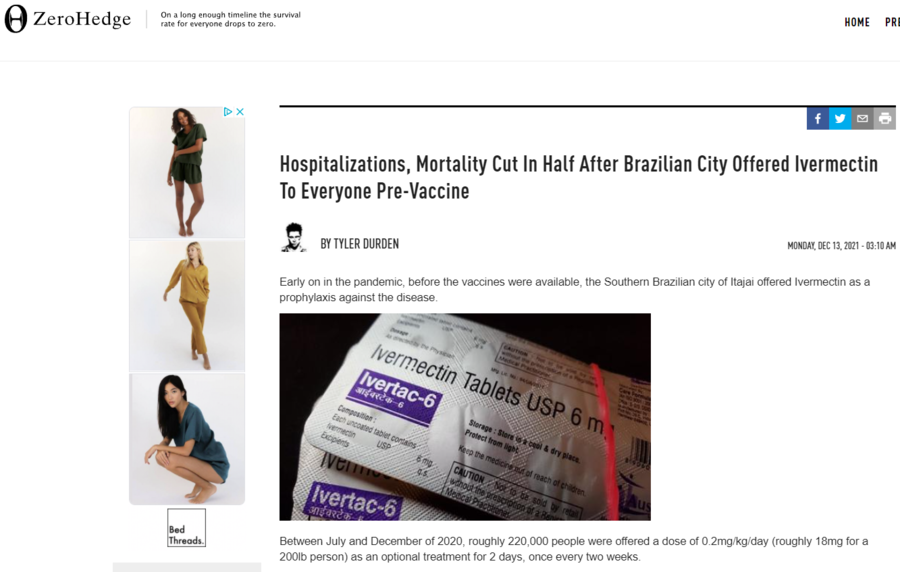
Did a Brazilian city cut hospitalizations and mortality in half after offering everyone ivermectin before COVID-19 vaccinations were available? No, that's not true: City officials in Itajai, Brazil, rebut the draft study, saying less than 10% of the 130,000+ people who started the Itajai health department's regimen of the antiparasitic medication continued taking the doses until the end. The much smaller participation numbers cast doubt on the conclusions of the study, which hasn't been peer-reviewed yet.
The claim appeared in an article (archived here) published by the ZeroHedge website on December 13, 2021, titled "Hospitalizations, Mortality Cut In Half After Brazilian City Offered Ivermectin To Everyone Pre-Vaccine." It opens:
Early on in the pandemic, before the vaccines were available, the Southern Brazilian city of Itajai offered Ivermectin as a prophylaxis against the disease.
Between July and December of 2020, roughly 220,000 people were offered a dose of 0.2mg/kg/day (roughly 18mg for a 200lb person) as an optional treatment for 2 days, once every two weeks.
133,051 people took them up on it, while 87,466 did not.
After analyzing the data, a team of researchers spanning several Brazilian institutes, the University of Toronto, and Columbia's EAFIT concluded in a December pre-print study that hospitalization and mortality rates were cut in half over the seven month period among the Ivermectin group.
This is what the post looked like on the ZeroHedge website on December 14, 2021:
(Source: The ZeroHedge screenshot taken on Tue Dec 14 15:46:16 2021 UTC)
The numbers in the ZeroHedge article come from a December 2021 preprint study, which has not undergone formal peer review or professional science journal editing. The study is titled "Ivermectin prophylaxis used for COVID-19 reduces COVID-19 infection and mortality rates: A 220,517-subject, populational-level retrospective citywide." It says out of a total of 220,517 subjects in Itajai, Brazil, 133,051 people, or 60%, were ivermectin users. The doses were given prophylactically before anyone was sick.
Well ahead of the study's release, city officials in Itajai questioned the accuracy and effectiveness of the ivermectin program in a January 21, 2021, news release titled "Clarification note - prophylactic treatments," which was translated by Google Translate:
Just as an example, when the Department of Health began distributing ivermectin, 138,216 residents took the first dose. Fifteen days later that number dropped to 93,970 people who took the second and third doses. Subsequently, only 8,312 people took the fourth and fifth doses. In other words, there was no biweekly continuation of the use of ivermectin, as recommended.
The claims by city officials that only 6% of participants in the ivermectin program completed their full regimen calls into question the study's results and conclusions when only a small fraction of them were taking the drug as recommended.
Lead Stories has previously debunked claims that ivermectin was a powerful COVID-19 treatment (here, here and here). Since March 31, 2021, World Health Organization treatment guidelines have included a recommendation not to use ivermectin in patients with COVID-19 except in the context of a clinical trial. And on August 26, 2021, the Centers for Disease Control and Prevention issued a health advisory on the antiparasitic:
Ivermectin is not authorized or approved by FDA for prevention or treatment of COVID-19. The National Institutes of Health's (NIH) COVID-19 Treatment Guidelines Panel has also determined that there are currently insufficient data to recommend ivermectin for treatment of COVID-19.
On its website, Merck, which could profit if the drug were proven and demand soared, was still, as of December 14, 2021, discouraging use of ivermectin against COVID. Merck says its review of available data shows: "No scientific basis for a potential therapeutic effect against COVID-19...Significant limitations in evidence for clinical activity or clinical efficacy in patients with COVID-19 disease, rendering existing data inconclusive, and; A lack of safety data in the majority of studies."













